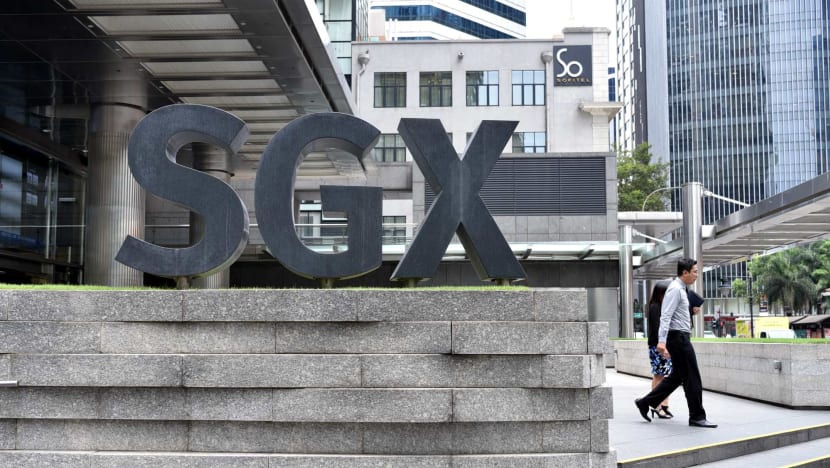Commentary: Timely for Singapore to support retail investors seeking compensation for wrongful losses
Making it easier to seek legal recourse will boost investor confidence in SGX, but it cannot replace due diligence, says former editor and financial journalist Ven Sreenivasan.

File photo of the SGX building (Photo: Jeremy Long)

This audio is generated by an AI tool.
SINGAPORE: The Singapore stock market has finally awoken from a long slumber over the past six months, in no small measure due to determined effort by the Monetary Authority of Singapore (MAS). The regulator’s latest proposal aimed at boosting investor confidence is much welcome – perhaps somewhat overdue.
On Oct 24, MAS unveiled proposed measures to help retail investors pursue legal action and seek redress for losses caused by market misconduct. This follows several measures announced this year to inject life back into the Singapore Exchange (SGX).
The most prominent measure has been the S$5 billion Equity Market Development Programme, whose purpose is to place funds with asset managers who will invest in the less popular mid-cap segment of the local market. Funds have also been dispersed for more analysts’ coverage of companies.
SGX itself has been rolling out initiatives to boost investor interest in local listings. It has been conducting seminars and management panel discussions, hosted at the SGX’s own premises. Investors – especially of the retail variety – can get deeper insights into the workings of listed companies here.
At the same time, the SGX’s regulatory arm (SGX RegCo) has stepped back somewhat from its perceived heavy-handed policing of the market and adopted a more disclosure-based regime, similar to other major stock exchanges. It is a more nuanced and targeted approach to deal with malfeasance and misconduct.
Yet malfeasance and misconduct do exist. This is where boosting investor interest and investor confidence go hand in hand.
WRITING OFF LOSSES IN SILENCE
Counters with weak governance and internal policing tend to be more vulnerable to malfeasance. And many victims of such incidents tend to be retail investors – regular folks who may have ploughed years of hard-earned savings into what they thought were good investments to tide them over their retirement years.
Given their finite financial resources and lack of procedural knowledge, most tend to write off their losses and suffer in silence.
The most infamous case of malfeasance remains the S$8 billion penny stock crash of 2013, where several listed counters associated with Malaysian tycoon John Soh Chee Wen were manipulated by parties who are still being prosecuted today. But while it is the most prominent, it is far from the only case.
Between July 2023 and December 2024, MAS recorded 33 criminal convictions, S$7.16 million in civil penalties and S$4.4 million in penalties for anti-money laundering breaches. False trading – which involves creating an artificial price or the appearance of trading volume – was associated with many of the individuals convicted or fined.
Among other activities detected were spoofing (rapid order placement and cancellation), unusual and suspicious volume bursts in thinly‐traded counters, and front running and promotions in chat groups or online forums suggesting “buy now” without clear disclosure.
Strengthening the recourse to action will help retail investors who for so long have kept silent when wronged.
HOW INVESTORS COULD BE ENABLED TO SEEK RECOURSE
MAS’ initiatives are thus timely and should be welcomed. There are three key proposals.
First, it proposes helping to establish an independent party, or designated representative, to represent and coordinate legal action on behalf of these retail investors.
Second, it plans to set up a grant to co-fund investor actions so they will not find it so prohibitive to take legal action. The grant will also defray the costs of the designated representative.
Third, it seeks to reduce the legal barriers for retail investors to take civil action, by simplifying and streamlining the process for investors to claim compensation based on existing criminal convictions or penalties.
Taken together, MAS reckons the proposed measures would complement public enforcement actions. It is seeking feedback from the market over the coming months until Dec 31.
The biggest positive here is the proposed grant to co-fund legitimate claims, essentially a sort of co-payment subsidy to support any commencement of action. This should embolden retail investors to step up when wronged.
Meanwhile, the shared ownership of action could prevent frivolous proceedings. MAS’ oversight would help ensure a proper structured process and the mechanism for identifying and supporting legitimate claims, for group representation through a leading litigant.
RISK OF SGX LOSING MOMENTUM
But there are some concerns. Taken to its extreme, there is a danger that these measures could result in overlitigation, leading to unnecessary pressure and putting resource constraints on the listed company and its management.
And if such litigation happens too frequently, there is a danger that the reputational risk could cast a long shadow over the market. It could also prompt the RegCo to step up enforcement action and move back to more active policing.
These would be unwelcome developments for a market which has just broken out of a moribund state it had been stuck in for much of the last decade.
There could also be space to do more to protect retail investors. One wonders whether some of these market measures could also be extended to financial institutions which mis-sell investment products to these investors.
These include bancassurance products, mini-bonds, equity linked investments and other sophisticated instruments which the average investor may not be sufficiently knowledgeable about. Nevertheless, they may be convinced to buy products they don’t really need without understanding the risks, by a smooth talker who promises enticing returns. While financial institutions have a fiduciary duty by law to act in the best interest of their customers, their agents – often with sales targets – can be dogged and persuasive.
Still, these proposed measures are a good first step. They will go a long way in addressing longstanding complaints that there is no practical recourse available to smaller investors to seek redress for market manipulation by individuals, or fraud by listed companies.
They may need to be refined or enhanced over time. If properly implemented and adopted, it can enhance the Securities and Futures Act.
But the onus also rests on investors – be they sophisticated or small – to invest carefully. Protections and legal recourse may help, but these cannot replace due diligence.
Ven Sreenivasan is a former editor and journalist who has covered financial markets, economic and corporate news and aviation for more than 30 years.



















